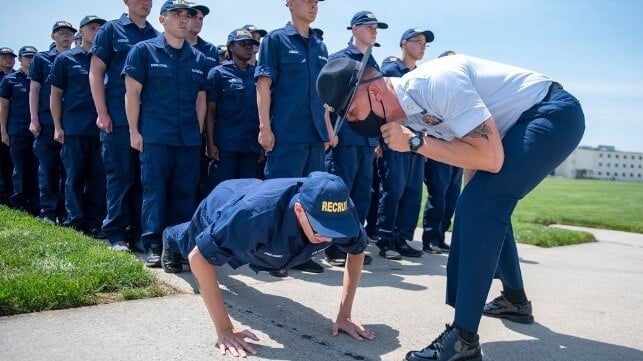U.S. Coast Guard May Try "Part-Time" Option to Boost Recruitment

To help fill a persistent recruiting gap, the U.S. Coast Guard wants to create a new category for "part-time" service, according to Commandant Adm. Linda Fagan. It's one of the many changes and initiatives that the USCG is undertaking to make the service a more attractive option to join and work.
When Adm. Fagan took up the post as commandant, the Coast Guard was 2,000 junior enlisteds short of its end strength target, and that number has only grown with time. At present, the service is about 4,800 people short of its goals. "We are not onboarding the full number of people that we need each week into Cape May," Fagan said at a forum at Brookings last week.
The composition of the pool has also changed. Many of the new enlisted recruits have already been in the workforce and have completed some form of higher education or credentialing program - meaning that they have skills that could be valuable to the USCG. In years past, recruiting was geared to 18-year-old high school grads with no prior work experience or college education, and there was no system for credential recognition for new arrivals. Experienced professionals would have to start from the bottom with everyone else.
To make better use of these skills, the Coast Guard has looked at lateral entry. "For example, say you're an aircraft mechanic and you're fully certified in the civilian community. You find you have a calling to serve and you'd like to come serve with us. We'd bring you in on a contract as an E-5 or E-6 for four years, maybe you stay, maybe you go back [to civilian life]" at the end, she explained.
In addition, Fagan's HR team is contemplating a new, extra category for service. Right now, the Coast Guard offers active duty, reserve and civilian job opportunities. "Might there be room for some other category - I'm going to use the term 'part time' - where you've got some level of benefit but you're working three days a week instead of the 24/7/365 contract that comes now," she proposed - adding the caveat that the service is "not there yet" on this novel concept.

that matters most
Get the latest maritime news delivered to your inbox daily.
Advertising to nontraditional labor markets and recruiting from a diverse pool is part of the solution too. This year, 45 percent of the cadets at the Coast Guard Academy are women, but across the rest of the organization, "we have work to do to continue to ensure that we reflect the society that we serve," said Fagan. Her goal is to ensure a high-performing, diverse workforce, in part by reducing barriers to entry and retention. A big part of this is in retooling the Coast Guard's HR system and policies, which have been more or less the same since the end of World War II.
"The mantra that I've given to the workforce team is 'eliminate barriers,'" she said.
